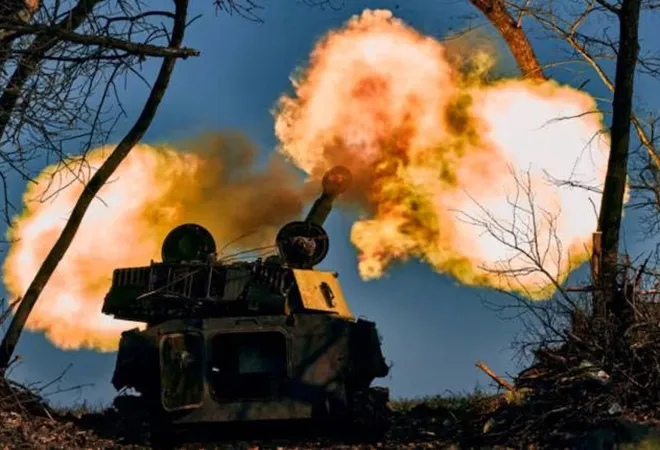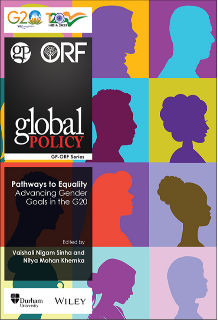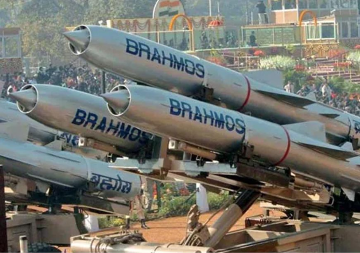The one-year anniversary of the Russian invasion of Ukraine marks an important turning point in our understanding of the post-Second World War global order. What was supposed to be a short and successful war against what seemed like a military minnow is now entering into its second year with the mighty Russian army looking like a pale reflection of its old self.
Every day that the Ukrainians have stood up against Russia is a reminder that in wars raw power differential is not really a determinant of battlefield success. Effective execution of resources matters much more and Russia has been found wanting at a number of levels.
Old Allies, New Purpose
Ukraine has also emerged as perhaps the final frontier in the struggle between the West and Russia on how to structure the post Cold War Eurasian security architecture. In a war that Russia can’t lose and Ukraine can’t win, it is now a battle of wills between the West and Putin.
The Ukraine crisis has galvanised the trans-Atlantic partnership and the North Atlantic Treaty Organization (NATO) that were seemingly losing its sense of purpose.
Biden's recent trip to Ukraine – his first as president – on the eve of the first anniversary of Russia's invasion was not only intended to reaffirm America's “unwavering commitment to Ukraine's democracy, sovereignty, and territorial integrity” but also to make it clear to Moscow that Washington has no intention of backing down as the war enters a dangerous phase of escalation.
The Ukraine crisis has galvanised the trans-Atlantic partnership and the North Atlantic Treaty Organization (NATO) that were seemingly losing its sense of purpose. Though there were some protests at the recent Munich Security Conference demanding a start of negotiations to end the war, the European policy makers reiterated their support for working together with the defence industry to scale up the production of munitions for Ukraine which, according to NATO Secretary General Jens Stoltenberg, is using them quicker than Europe can replace them.
Interestingly, it was Germany that demanded faster delivery of weapons to Europe, as well as calling on the NATO alliance to agree to meet the target of 2 per cent of GDP on defence. Meanwhile, contrary to Putin’s ostensible objective of ensuring NATO doesn’t reach Russian borders, his invasion has done the opposite, pushing Sweden and Finland towards NATO after decades of deciding to remain neutral.
The China-Russia Axis
The global balance of power that was already in flux before the war is now explicitly polarised with the firming up of the China-Russia axis. Both the US and the EU have warned China that it would be crossing a “red line” if it goes ahead with providing lethal aid to Russia amid growing concerns that Beijing might be moving in that direction.
Though China has been supporting Russia with non lethal aid so far, as Russia struggles on the battlefield and Ukraine gets high end tanks and ammunition from the West, China’s support could be critical in ensuring the longevity of the Russian offensive. This relationship is only likely to get stronger in the absence of any western effort in breaking the axis.
While Beijing has been trying to make a case that they are fed up with the escalating conflict in Eurasia and calling for peace and a settlement, they have also been critical of “certain forces” that want to see the war prolonged. The strategic logic of a strong Beijing-Moscow partnership is quite evident and both sides are likely to take it to its logical conclusion.
Both the US and the EU have warned China that it would be crossing a “red line” if it goes ahead with providing lethal aid to Russia amid growing concerns that Beijing might be moving in that direction.
Ukrainian President Volodymyr Zelensky too has warned China against supporting Russia in its war on Ukraine, suggesting that doing so would bring on a world war. China’s entry would make the conflict more than just a Eurasian war and will bring in the Indo-Pacific dimension as well.
Global South Suffers
While this major power contestation is becoming the defining feature of our times, the food, fuel and the wider economic crisis fueled by the Ukraine war is wreaking havoc in a large part of the world and it is getting unnoticed. As major powers seek decisive strategic advantages, the existential crisis in the developing world is getting acute by the day.
Even in South Asia, the economic dominoes have been falling like ninepins. Grim economic situation in Sri Lanka, Nepal, Pakistan and even Bangladesh stands testimony to the inability of the world to provide adequate solutions to the problems facing the Global South.
As we enter another year of the Ukraine conflict, the world stands on the edge of a precipice. The global leadership vacuum is visible and ineffectiveness of the multilateral order is glaring. We are witnessing the resurrection of hard power in shaping the strategic calculus of major powers and the changing nature and character of warfare with the technological shifts is reshaping the battlefields in some fundamental ways.
As the dust refuses to settle in Ukraine even after a year of turmoil, it is a stark reminder that despite liberal protestations, violence continues to stand at the very heart of the global political order and is unlikely to yield its centrality anytime soon.
This commentary originally appeared in Money Control.
The views expressed above belong to the author(s). ORF research and analyses now available on Telegram! Click here to access our curated content — blogs, longforms and interviews.




 PREV
PREV


